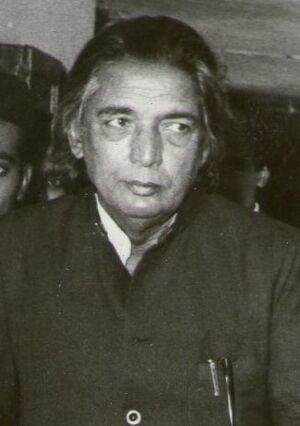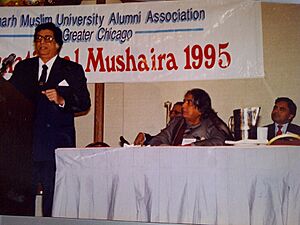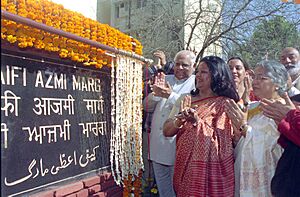Kaifi Azmi facts for kids
Quick facts for kids
Kaifi Azmi
|
|
|---|---|
 |
|
| Born |
Athar Husain Rizvi
14 January 1919 |
| Died | 10 May 2002 (aged 83) Mumbai, Maharashtra, India
|
| Occupation |
|
| Political party | Communist Party of India |
| Spouse(s) |
|
| Children |
|
| Awards | National Film Award for Best Lyrics (1970) Padma Shri (1974) Sahitya Akademi Award (1975) Sahitya Akademi Fellow (2002) |
Kaifi Azmi (born Athar Husain Rizvi; 14 January 1919 – 10 May 2002) was a famous Urdu poet from India. He is known for bringing Urdu poetry into Indian movies. He took part in many popular poetry gatherings called Mushairas. Kaifi Azmi was also a communist. He hoped to see India become a socialist state one day. His wife, Shaukat Kaifi, was a well-known actress in theatre and films.
Contents
Biography
Early Life
Kaifi Azmi was born into a Shia Muslim family. This was in a village called Mijwan in the Azamgarh district of Uttar Pradesh. He got his pen name, Azmi, from the city of Azamgarh.
Family Life
Kaifi Azmi came from a family of artists. His three brothers were also poets. He married Shaukat Azmi. They had a daughter, Shabana Azmi, who became a famous actress. Their son, Baba Azmi, became a cinematographer. Kaifi Azmi's daughter-in-law, Tanvi Azmi, is also an actress.
During the time of India's partition, Kaifi Azmi was hiding. The British police were looking for him because he was a "card-carrying communist". His parents and brothers left India by ship for Karachi. By the time he came out of hiding, their ship had already sailed. For several years, he was not allowed to get a visa for Pakistan. This was because he was a communist, even though his family lived there.
Career
His Writings
When he was just eleven years old, Kaifi Azmi wrote his first ghazal. A ghazal is a type of poem. He recited a part of it at a mushaira, which is a poetry gathering. Everyone loved it, but many thought it was written by his older brother. When his brother said it wasn't his, Kaifi's father tested him. He gave Kaifi a line and asked him to complete a ghazal. Kaifi accepted the challenge and wrote a complete ghazal. This poem became very popular across India. A famous singer, Begum Akhtar, even sang it.
In 1942, Kaifi Azmi stopped his studies of Persian and Urdu. This was during the Quit India movement. Soon after, in 1943, he became a full-time member of the Communist Party of India. During this time, important writers noticed him. They were impressed by his leadership and encouraged his poetry. Kaifi Azmi became a well-known poet. He also joined the Progressive Writers' Movement in India. At 24, he started working with textile mill workers in Kanpur. He gave up his comfortable life to work for the party. Later, he moved to Bombay to continue his work with workers there.
His Poetry
Like many Urdu poets, Kaifi Azmi started by writing ghazals. These poems often focused on love and romance. But when he joined the Progressive Writers' Movement and the Communist Party, his poetry changed. He began writing about social issues. His poems highlighted how ordinary people were treated unfairly. He wanted to see a fairer society.
Even though his poems had strong messages, they were still beautiful. They showed deep feelings and care for people who were struggling. His poems also used rich and vivid images. This made his contribution to Urdu poetry very special. Kaifi Azmi's first collection of poems, Jhankar, was published in 1943.
Some of his most famous poems include Aurat, Makaan, Daaera, Sanp, and Bahuroopni. His important books of poetry were Aakhir-e-Shab, Sarmaya, and Awaara Sajde. He also wrote articles for Urdu Blitz in a collection called Kaifiyaat. Meri Awaaz Suno was a collection of his film songs. He also wrote the script for Heer Ranjha.
His Work in Films
Kaifi Azmi worked in films as a lyricist (song writer), writer, and even an actor. He wrote his first song lyrics for the film Buzdil in 1951. He also wrote for films like Yahudi Ki Beti (1956) and Miss Punjab Mail (1958).
Writers like Kaifi Azmi helped change Hindi film songs. They brought a fresh, new style to the lyrics. One of his biggest achievements was writing the entire dialogue for Chetan Anand's film Heer Raanjha (1970) in verse (like poetry). This was a huge accomplishment in Hindi cinema. He also received praise for the script, dialogues, and songs of Garam Hawa (1973). He wrote dialogues for films like Manthan (1976).
As a lyricist, he wrote for many movies. He is especially remembered for Guru Dutt's Kaagaz Ke Phool (1959) and Chetan Anand's Haqeeqat (1964), which is a famous war film. Other notable films he wrote songs for include Anupama (1966), Saat Hindustani (1969), Pakeezah (1972), and Arth (1982).
For the film Naunihal (1967), he wrote the song "Meri Aawaz Suno Pyar ka Raaz Suno". This song was shown during the funeral procession of India's Prime Minister, Jawahar Lal Nehru. Years later, after Kaifi Azmi passed away, his daughter Shabana Azmi said she found comfort in the words of this song.
Kaifi Azmi also wrote the lyrics for Bible Ki Kahaniyan. This was the first Christian mythological TV show in India. He also acted in the film Naseem (1995), playing the role of Naseem's grandfather.
| Year | Title | Role | Notes |
|---|---|---|---|
| 1995 | Naseem | Naseem's Grandfather | Actor |
Kaifi Azmi passed away on 10 May 2002, at about 83 years old. His wife, daughter, and son survived him. His life story is part of a book called Aaj Ke Prashid Shayar: Kaifi Azmi.
Awards and Recognition
Kaifi Azmi received many important awards. In 1974, he was given the Padma Shri. This is India's fourth-highest award for civilians. He also won the Sahitya Akademi Award for Urdu in 1975 for his poetry collection Awaara Sajde. He received special awards from Urdu academies and the Soviet Land Nehru Award. He also got the Lotus Award and the President's Award for promoting national unity.
In 1998, the Government of Maharashtra gave him the Jyaneshwara Award. For his lifetime achievements, he was also honored with the prestigious Sahitya Akademi Fellowship.
In the 1980s, Kaifi Azmi returned his Padma Shri award. This happened after the Chief Minister of Uttar Pradesh made a disrespectful comment about people who spoke Urdu. Kaifi Azmi's daughter, Shabana Azmi, said her father felt he had to stand up for himself and the Urdu language.
In 2000, the Government of Delhi gave him the first Millennium Award. He also received an honorary doctorate from Visva-Bharati University.
Tributes
To honor him, a train was named "Kaifiyat Express". It runs from his hometown, Azamgarh, to Old Delhi.
On 14 January 2020, Google honored Kaifi Azmi with a special picture called a Google Doodle. This was on his 101st birthday. Google said that Kaifi Azmi was one of the most famous poets of the 20th century in India. They noted his work included love poems, activist verses, Bollywood songs, and screenplays. They also mentioned that his efforts to help people still make a difference today.
There are also streets named after him. One is Kaifi Azmi Road in Hyderabad. Another is Kaifi Azmi Marg in R. K. Puram, New Delhi.



